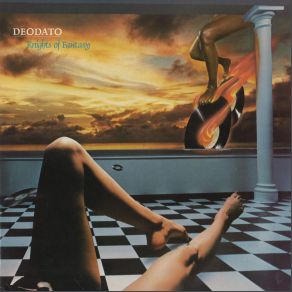Knights of Fantasy
Download links and information about Knights of Fantasy by Deodato. This album was released in 1979 and it belongs to Hip Hop/R&B, Soul, Jazz, Rock, Dancefloor, Disco, Dance Pop, Funk genres. It contains 5 tracks with total duration of 33:30 minutes.

|
|
|---|---|
| Artist: | Deodato |
| Release date: | 1979 |
| Genre: | Hip Hop/R&B, Soul, Jazz, Rock, Dancefloor, Disco, Dance Pop, Funk |
| Tracks: | 5 |
| Duration: | 33:30 |
| Buy it NOW at: | |
| Buy on iTunes $3.49 | |
Tracks
[Edit]| No. | Title | Length |
|---|---|---|
| 1. | Space Dust / Sherlock | 7:58 |
| 2. | Shazam | 7:58 |
| 3. | Bachmania: Jesu, Joy of Man's Desiring / Love Is Blue / Whistle Bump | 7:07 |
| 4. | Knights of Fantasy | 6:28 |
| 5. | Lovely Lady | 3:59 |
Details
[Edit]Deodato's Knights of Fantasy, released in 1979, contains trace elements of the Brazilian producer and composer's fusion persona while melding them with disco and lite funk — as many other jazzmen were also doing at the time, from Lonnie Liston Smith to the Crusaders. The album is a thoroughly kitschy sci-fi affair with some very fine playing and horn and string arrangements, particularly on the bass- and ARP-driven "Space Dust/Sherlock," which goes on for nearly eight minutes. Here, funk grooves are allowed to find their way and wind out while a popping bassline holds down the fort even as Deodato goes ape on the synth for his wildly improvisational solo. "Shazam" is another case in point, though it contains some smoking Brazilian polyrhythms undercutting the basic disco funk groove and a slight riff cop from Talking Heads' "Life During Wartime." The weirdest thing here is one of Deodato's trademarks — taking classical themes and weaving them together in some "futuristic" way. In this case it's Bach, as he combines the composer's Jesu, Joy of Man's Desiring with Andre Popp's "Love Is Blue" (a huge easy listening hit in the 1960s by Paul Mauriat & His Orchestra) and his own "Whistle Bump"! The bottom line is that while it's somewhat shocking, it doesn't really work at all — there are too many variables and too many instruments layered in, and when the disco groove tropes are added on top it falls far short of the mark. The title track is a handclap-saturated lite dance tune with a killer guitar solo by John Tropea., Rovi